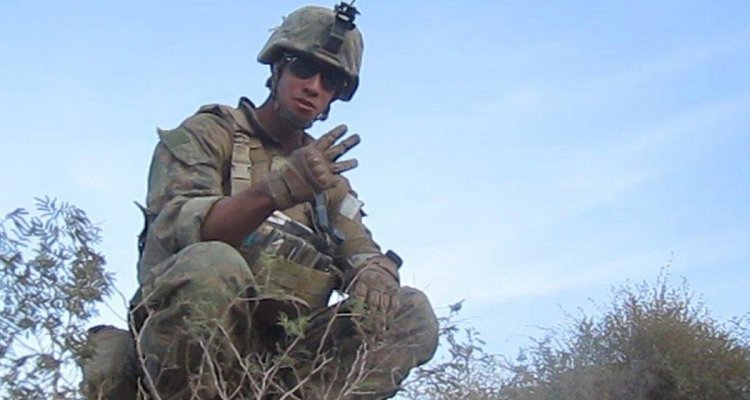War is “boredom punctuated by moments of terror,” as the old adage goes. Boredom, however, has never made for a good film, which has led to a cinematic century of war presented as an exciting, if horrifying endeavor. And while some films (“Full Metal Jacket” and “Platoon“) edged ever closer to the ghastly reality, and others (“Jarhead“) captured the tedium, none seem to embody the stark duality as “Combat Obscura” so fully.
The new documentary opens with a list of disclaimers, chiefly that the film — which was shot by director Miles Lagoze and a few others while in Afghanistan in 2011 when Lagoze was a videographer for a Marine battalion — is not endorsed by the Department of Defense. “We filmed what they wanted, but then we kept shooting,” a title card reads. It can be assumed that what “they” wanted was propaganda: Marines as ambassadors, handing out chocolate, meeting with tribal leaders, and generally bringing peace to a wartorn country. And Marines as super soldiers using the best technology in the world to fight terrorism.
Lagoze captures this. There are plenty of heart-pounding firefights with unseen enemies. And the Marines are generally amenable to local children who are wearily curious about the foreign invaders. Midway through, the loose, narrative-free film is even interrupted with a CNN segment featuring scenes Lagoze captured. And while the footage CNN airs certainly isn’t propaganda, it is a far cry from the reality Lagoze posits with “Combat Obscura.”
There is a choice in the film to eschew perspective and plot. None of the soldiers are ever formally identified, their mission is never explained, and their decisions are never considered — on or off the battlefield. What comes across instead is a sort of profound meaninglessness. The soldiers stand in for all soldiers, the mission is inexpiable, and their decisions lack consideration. But “Combat Obscura” is not an indictment of individual Marines — they are mostly just kids, young men with large guns and even more significant responsibilities. The film instead seems more interested in telling the truth: That if there was meaning behind the U.S. invasion, there’s rarely meaning present on the battlefield.
In one scene the soldiers inspect a dead body. Rolling him over, one mutters that it’s just like a dead deer. Another seems to realize, “We killed a shopkeeper.” All the while, his body is prodded; it is determined he did not die right away. There is a hint that he suffered. It’s a particularly disturbing sequence, and an undeniably damning one for the DoD (which threatened legal action against Lagoze, but eventually decided not to pursue any), but “Combat Obscura” is not interested in sussing out the details or hounding anyone about the mistake. Instead, the moment passes. The next firefight begins. There is something strikingly troubling buried in the lack of context for the killing of an ostensibly innocent man. But the point is clear: This is just another day. Another mission. Another fuck up. And in order to survive, the only thing to do is to look ahead.
A real challenge for “Combat Obscura,” though, in this age of GoPro cameras and YouTube, is to create a clear delineation between Lagoze’s film and the scores of videos produced by the young troops fighting in Iraq and Afghanistan who are uploading them directly online. The obvious difference is that “Combat Obscura” is a film (though at just 70 minutes, it is a truncated one), where others are amateurishly produced bursts of action. What the film should offer is insight or context or perspective, because even if such qualities are intentionally left on the cutting room floor, without them “Combat Obscura” turns numbing, the violence less shocking, the bursts of gunfire less surprising. What starts as harrowing and heartbreaking becomes more or less desensitizing. Which is the trajectory of a soldier’s experience. The explosive highs and insufferable boredom are a potent and destabilizing mix. Normal becomes hard to identify. And the experience hard to vocalize. So while Lagoze’s film may not offer any genuinely new insights, it is an unsettling opportunity to bear witness to the numbing chaos of war. [B]

